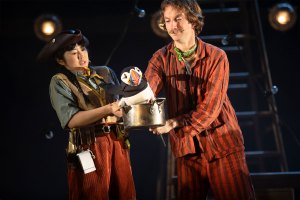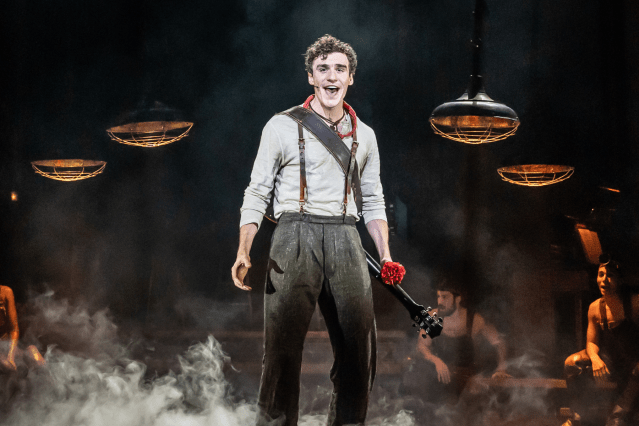Tom Murphy plays a blinder
One of the most mysterious passages in the fantastic DruidMurphy festival of plays at Hampstead Theatre occurs when the embittered, sermonising teacher in the first of them, Conversations on a Homecoming, recites the speech of Prince Hal in Henry IV, Part One: “I know you all, and will awhile uphold the unyoked humour of your idleness…”
The teacher seems to promise a corrective rule of law and assertion in the dead-end Galway pub where, in the early 1970s, the regulars are aiming to shake themselves, not all that ruthlessly, out of a slough of despond. They might even march on the north, some of them.
Of course, nothing much will change, and not at all for the better, and that’s the source of irony and tragedy in Tom Murphy’s triptych about leaving (and returning) home. But in Henry V, Hal does show his true mettle, and finds cause in the war against France: “I’ll so offend to make offence a skill, redeeming time when men think least I will.”
And in the new film of Henry V, directed by Thea Sharrock as part of both the Shakespeare Unlocked season on BBC TV, and the London 2012 Cultural Olympiad, charismatic Tom Hiddleston as the new king – taking to the role in cinematic succession to Olivier and Kenneth Branagh (and coming in well behind them in third place) – toughens up big time at Harfleur and Agincourt but is finally weak and defeated.
This is because the film takes the curious decision to place the narrative in the context of his funeral; Henry died of dysentery aged 36, succeeded by a son who messed it all up until the House of York bounced back after the defeat of Richard III on Bosworth Field.
The Chorus in the new film is an invisible John Hurt – invisible until the last scene, when he emerges by the coffin in the cathedral. Sharrock’s film, which I saw at a special screening in the British Museum on Friday night, in advance of the telecast, is no cinematic masterpiece.
The very opposite, in fact. The play is cut to ribbons but still the film goes very slowly, and unexcitingly, over just two hours. You’re much better off cutting along to the Globe to see Dominic Dromgoole‘s fully energised, virtually uncut production with Jamie Parker in the lead and Sam Cox as one of the best, and funniest, Pistols ever.
Sharrock’s Pistol, Paul Ritter, has a nervous breakdown at Agincourt, probably because they’ve cut the business of Fluellen’s leek. Poor old Fluellen, played by a very hairy Owen Teale, has lost half his lines and all his wit and comedy, not to mention his two fellow Captains, MacMorris and Gower.
I’ll be fascinated to see how this all follows through – if indeed it does – from Richard Eyre‘s film of the two parts of Henry IV, in which Hiddleston lays the foundations for his posh boy Henry, presumably clubbing away in Eastcheap rather like the present-day Prince Harry hanging out in blue jeans in Mayfair.
Certain episodes are played up with an almost wearisome predictability: the death of Falstaff with a single melancholy flashback of Simon Russell Beale looking 20 years too young for the role; the execution of Bardolph, hung on a tree; the killing of the prisoners. And the music is both annoying and terrible.
Who to look out for? Well, Tom Burke as a mooncalf Nym; Julie Walters as a Mistress Quickly far less moving than Judi Dench in Branagh’s film, but very good all the same; Malcolm Sinclair as an archbishop (I’m scratching around here, you can tell), James Laurenson and Anton Lesser as a pair of nodding dukes, Lesser gaining a laugh at least on “Tennis balls, my liege.”
I’m afraid that Richard Griffiths as their French counterpart, the Duke of Burgundy – whose great speech in the last act is rendered meaningless – is very hard to watch, an effortful spluttering of incomprehensible remarks about a ravaged nation.
The cuts and the emphases in both the Olivier and Branagh versions had style and utter conviction, and they worked, even if you disagreed with them. But this version is just, well, attitude-free, routine. Even the battle scenes are boring; they look like one of those self-conscious re-enactments done by weird historical societies on Bank Holidays in the Cotswolds.
The thing about the Tom Murphy plays from Druid is that they speak passionately and authentically about nationhood and colononialism at a deeply human level. Murphy, like his great Irish compatriots Brian Friel and Seamus Heaney, is writing about his own life, his own countryside, his own politics, his own friends and family. And he finds theatrical metaphor and poetic structures to convey all this, just as Shakespeare did; or didn’t, as it happens, in this new film.
The Shakespeare Unlocked season opened on BBC4 last night with a broadscast of Gregory Doran‘s brilliant all-black RSC version of Julius Caesar. I’d have watched it had I not been glued to the quarter final of the European Championship in which Italy destroyed England in a one-sided 0-0 draw. And then rubbed it in by winning the penalty shoot-out.
Hey-ho, back to the drawingboard, once more unto the breach, dear friends… Steven Gerrard, our monosyllabic captain, was no valiant, oratorical King Henry, and a lardy-looking Wayne Rooney, a bumbling Bardolph, no saviour in disguise.












